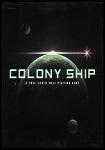
Colony Ship - Taking Care of Business
Vince takes us through the development years of Colony Ship that shows it hasn't been an easy ride.
2019 was a stressful, no good, very bad year. The loss of a friend and a team member who’s been with us since the beginning (2005) was a harsh, surreal blow, and it fell during the hardest phase of game development (hard enough even without such losses) where many indie projects (those not destined to make it) falter and fail.
Anyone who’s ever followed such projects knows how it usually goes: Year 1 - making bold promises, proudly showing concept art, weapon models, the main menu (the most important part of a game, no doubt), etc. Year 2 - the first playable, barren like a desert, noticeable drop in the team’s enthusiasm, the first wave of volunteers leaving the project. Year 3 - the grim year(s), progress slowing down to a crawl, waning support (the crowd that cheered every time a new weapon or vehicle was posted is less enthusiastic about vital but invisible things like pathfinding, functioning inventory, and object classes), more and more people leaving until only 2-3 guys remain, at which point the project enters the state of suspended animation and stays there until someone makes the final announcement.
We had a couple close calls with AoD and CSG, but we made it through our first game and we're over the hump of our second full-scale game. The purpose of this update is to take you backstage and walk you through the whole process. Maybe it would even help teams ready to throw their hats into the RPG ring prepare for the inevitable challenges ahead. Without further ado, here's a recap of how those last three years have gone for Colony Ship:
Year 1 was about Dreaming Big:
- Designing the systems (character, combat, inventory, stealth, dialogue, etc) and mapping out the storyline in broad strokes (branching main quest, locations, factions, and key players)
- Developing tools and editors, adjusting the engine to our RPG needs, building the foundation: animation system, character and item classes, grid and pathfinding, switching levels, basic AI so that combatants would know what to do, etc.
- Defining locations (concept art) and creating art assets based on the concept art (mainly time-consuming 3D models: weapons, armor, level props).
While “dreaming big” takes a backseat to far nobler tool-making, the former defines the latter and affects it in every imaginable way, making changes in Year 3 nearly impossible (without redoing half the systems).
Last year we received three publishing inquiries, one from a well-known company, which means that our humble efforts, completely ignored by the media, weren’t overlooked by publishers. To be honest, I have the same reaction to a publisher reaching out as a medieval peasant to the devil tapping him on the shoulder and inquiring if he’s in need of any assistance. Such a deal comes with limitless and exciting opportunities to get screwed, so usually I decline politely just to be on the safe side.
Among other things, the publisher offered to test our design theories (via focus groups and market research) to see if that’s what the market really wants and was surprised to hear that our ‘business model’ (for the lack of a better word) is to work our butts off for 3 years on a faint hope that our target audience would actually like it. It *is* a gamble and we were far from certain that the players would like the combat system. Tweaks and improvements are to be expected, of course, but radical changes would be nearly impossible.
The point of this story is that the design done in Year 1 sets the course for the next 3-4 years and you end up betting on a favorable outcome without any certainties. Who wouldn’t want to be an indie game developer?
Information about
Colony ShipSP/MP: Single-player
Setting: Sci-Fi
Genre: RPG
Platform: PC
Release: Released

